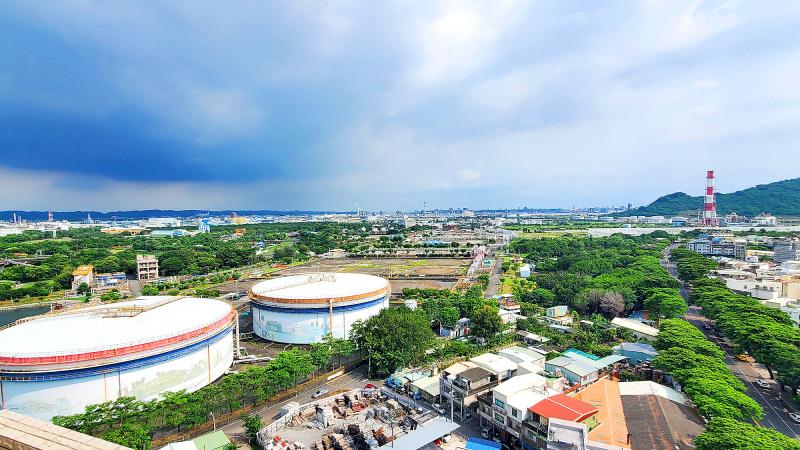Taiwan Semiconductor Manufacturing Co (TSMC, 台積電) yesterday said it was not ruling out any possibility after the Chinese-language Economic Daily News reported that the world’s largest contract chipmaker is planning to build a new 7-nanometer hub in Kaohsiung’s Linyuan District (林園).
TSMC is expected to build the process hub on a 169.5 hectare site that was until 2015 a CPC Corp, Taiwan (CPC, 台灣中油) naphtha cracker complex, the report said.
The chipmaker is to launch its Kaohsiung investment plan in 2023, the report said.

Photo: CNA
The company did not directly respond to the report, but said in a statement that Taiwan is its major production hub as it expands globally and it does not rule out the possibility of investing in Kaohsiung.
Setting up a new plant requires careful evaluation of factors, TSMC said, adding that it would continue to survey land in cities such as Hsinchu, Taichung and Kaohsiung to expand its production capacity.
It would make any expansion plans public when they are finalized, the statement said.
TSMC is rolling out chips made using the advanced 7-nanometer process at a plant at the Central Taiwan Science Park (中部科學園區) in Taichung.
Last month, Chinese-language media reported that Kaohsiung authorities had talks with TSMC to get an idea of what the chipmaker needed to invest in the city and raised the possibility of helping the firm to secure the land previously used by CPC.
The Economic Daily News report said that TSMC initially plans to build six 7-nanometer plants in Kaohsiung and use the city as its global hub to develop the process.
TSMC accounts for 85 percent of global 7-nanometer production capacity, analysts said, adding that if an investment in Kaohsiung is initiated, it would target boosting production to meet rising demand for Internet of Things and automotive electronics applications.
The 5-nanometer process is TSMC’s most advanced technology to enter mass production, with a foundry for the technology at the Southern Taiwan Science Park (南部科學園區) in Tainan operating since the second quarter of last year.
The chipmaker is building a 3 nanometer fab at the Southern Taiwan Science Park scheduled to start mass production in the second half of next year.
In addition, TSMC is investing US$12 billion to build a 5-nanometer fab in Arizona, with production scheduled to begin in 2024.
TSMC has said it is considering investments in Germany and Japan, and expanding in the US to meet strong demand in those markets.

Taiwan Semiconductor Manufacturing Co (TSMC, 台積電) would not produce its most advanced technologies in the US next year, Minister of Economic Affairs J.W. Kuo (郭智輝) said yesterday. Kuo made the comment during an appearance at the legislature, hours after the chipmaker announced that it would invest an additional US$100 billion to expand its manufacturing operations in the US. Asked by Taiwan People’s Party Legislator-at-large Chang Chi-kai (張啟楷) if TSMC would allow its most advanced technologies, the yet-to-be-released 2-nanometer and 1.6-nanometer processes, to go to the US in the near term, Kuo denied it. TSMC recently opened its first US factory, which produces 4-nanometer

GREAT SUCCESS: Republican Senator Todd Young expressed surprise at Trump’s comments and said he expects the administration to keep the program running US lawmakers who helped secure billions of dollars in subsidies for domestic semiconductor manufacturing rejected US President Donald Trump’s call to revoke the 2022 CHIPS and Science Act, signaling that any repeal effort in the US Congress would fall short. US Senate Minority Leader Chuck Schumer, who negotiated the law, on Wednesday said that Trump’s demand would fail, while a top Republican proponent, US Senator Todd Young, expressed surprise at the president’s comments and said he expects the administration to keep the program running. The CHIPS Act is “essential for America leading the world in tech, leading the world in AI [artificial

REACTIONS: While most analysts were positive about TSMC’s investment, one said the US expansion could disrupt the company’s supply-demand balance Taiwan Semiconductor Manufacturing Co’s (TSMC, 台積電) new US$100 billion investment in the US would exert a positive effect on the chipmaker’s revenue in the medium term on the back of booming artificial intelligence (AI) chip demand from US chip designers, an International Data Corp (IDC) analyst said yesterday. “This is good for TSMC in terms of business expansion, as its major clients for advanced chips are US chip designers,” IDC senior semiconductor research manager Galen Zeng (曾冠瑋) said by telephone yesterday. “Besides, those US companies all consider supply chain resilience a business imperative,” Zeng said. That meant local supply would

Servers that might contain artificial intelligence (AI)-powering Nvidia Corp chips shipped from the US to Singapore ended up in Malaysia, but their actual final destination remains a mystery, Singaporean Minister for Home Affairs and Law K Shanmugam said yesterday. The US is cracking down on exports of advanced semiconductors to China, seeking to retain a competitive edge over the technology. However, Bloomberg News reported in late January that US officials were probing whether Chinese AI firm DeepSeek (深度求索) bought advanced Nvidia semiconductors through third parties in Singapore, skirting Washington’s restrictions. Shanmugam said the route of the chips emerged in the course of an